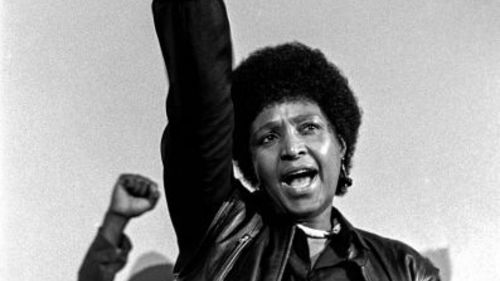Global Issues
Winnie the Winner! -By Kọle Ọmọtọṣọ


Winnie Mandela
Surprise is the first response to the passing of Winnie Madikizela-Mandela today at the age of 81. Nobody expected anything so drastic to happen to this strong and beautiful woman whose life was defined by the fate of the man she married and her own personal daemons. There had been a knee operation some months back and the admission into a hospital in the city of Johannesburg. And now the announcement of her passing on.
A few months ago at the December African National Congress (ANC) meeting, Winnie could be seen being what she loved to be – if not the mother of the nation, then the mother of the African National Congress. There she held the hands of Cyril and Jacob, wishing them to make up and be friends.
Winnie Mandela was born Nomzamo Winifred Zanyiwe Madikizela on September 26, 1936. She trained as a social worker and later got a bachelor’s degree in social work from the University of South Africa.
In 1958 she married Nelson Mandela, a young, dashing and charismatic lawyer member of the African National Congress. They were married until 1996 when Nelson sued her for divorce. They had two daughters, Zenani (born in 1958) and Zindziwa (born in 1960). The marriage to Mandela, the African National Congress that became her home and her own faith in and steadfastness to the rightness of her husband’s struggle, and the struggle of the ANC, defined her life.
The Rivonia Trial led to Nelson being sentenced to life imprisonment. As he began his imprisonment, Winnie also began her life of hell, becoming constantly harassed by the apartheid government’s agents, police and security. She was to live, putting forward his name and story out there for all to know and acknowledge. At a cost to her and her young children. As long as she was out there disobeying the apartheid government, the Mandela name could not be forgotten.
Sometimes she even went beyond disobeying the apartheid government. She went further than the official position of the ANC on many issues. One was on the matter of violence. She maintained that it was the apartheid government that was violent to those who were struggling for their freedom. It was impossible, she maintained, to equate the fight back of the freedom fighters with the violence of the defenders of apartheid.
It was her maintenance of this position that made Archbishop Desmond Tutu plead with her, in vain, at the Truth and Reconciliation Commission, to concede a little to the idea of mutual violence. She refused.
She was famously quoted as saying that South Africans would liberate themselves through the necklacing of those who betray the struggle. From prison, Mandela made it known that Winnie must be protected in his absence.
Out of the waiting of the women whose husbands were imprisoned on Robben Island, musicians, artists and writers created myths out of Winnie Mandela and her fellow women freedom fighters. These are women who had been conditioned to wait for their men: from the migrant labour system, to political exile, activism and imprisonment – a waiting without the known extent of waiting time. Out of this tragic situation, Njabulo Ndebele wrote the novel The Cry of Winnie Mandela in 2004. As a reviewer said of the novel then: “The frame is Homer’s Penelope, eternal symbol of the constant wife but a ‘thing without agency’, trapped in a social law created by men that demands an inhuman fidelity.”
Winnie suffered for Nelson Mandela and for the African National Congress. She was detained by the apartheid government and separated from her young children. She was accused of torturing and even killing a child. All these she bore until finally her waiting ended and Nelson Mandela was released.
In her own right as a senior member of the ANC, Winnie Mandela participated in the process that negotiated the freedom that was born in April 1994. She became a deputy minister of Arts, Culture, Science and Technology.
Whatever Winnie did to annoy Nelson Mandela should have been forgiven, in the eyes of many South Africans, especially the female population. After all, Nelson Mandela forgave the racist white government and its functionaries. Why could he not forgive Winnie Mandela?
Her last years were spent attempting to ignore the divorce from Nelson Mandela. She even made the argument that as long as the bride price paid on her was not returned by her family to the family of Nelson Mandela, she was still his wife. The modern divorce law which separated them did not welcome any intervention by the ancestors.
Ultimately, the colourful, triumphant life of Winnie Mandela is a life of itself, for itself, for her children and ultimately for her country. She is not a mere footnote in the history of the life of Nelson Mandela. She is not a mere footnote in the history of the African National Congress. Where ever the story of the liberation of South Africa is told Winnie will always win her page of participation in that struggle. She lives as long as South Africa lives, striding side by side with the men of the struggle; with Nelson Mandela.
Kole Omotoso writes from Akure, Nigeria.




















